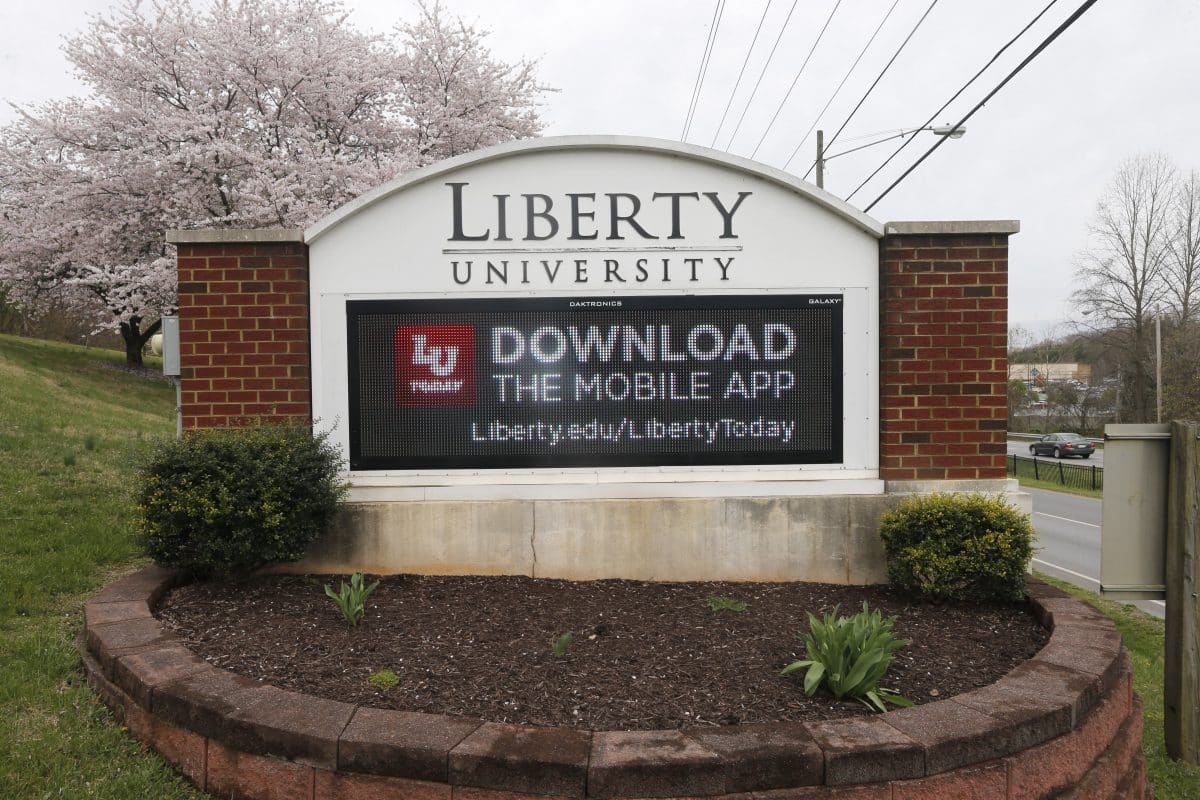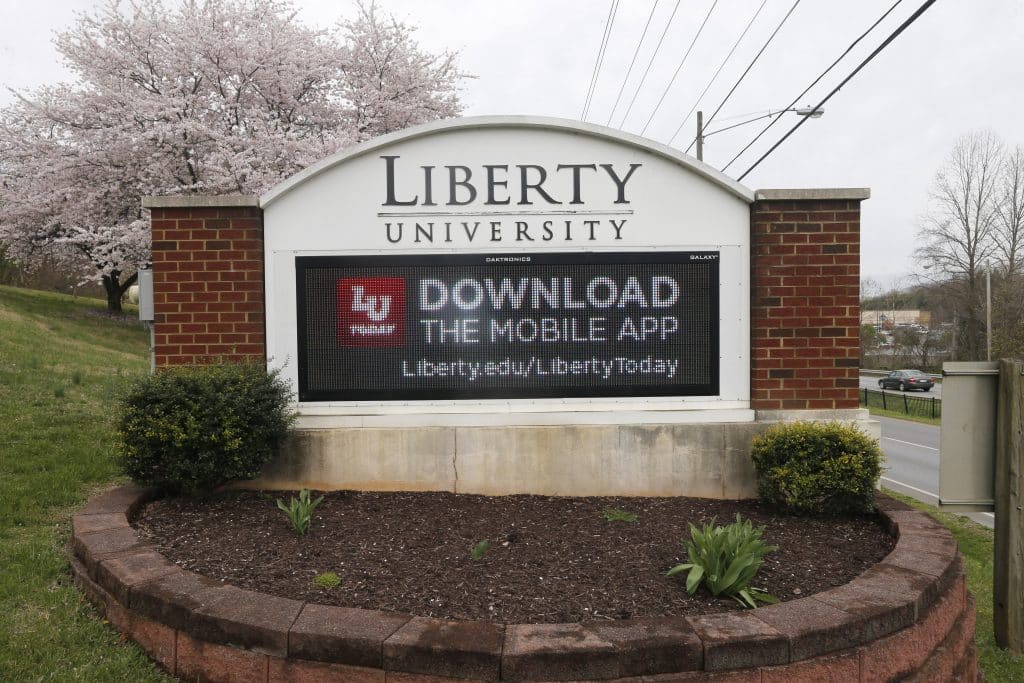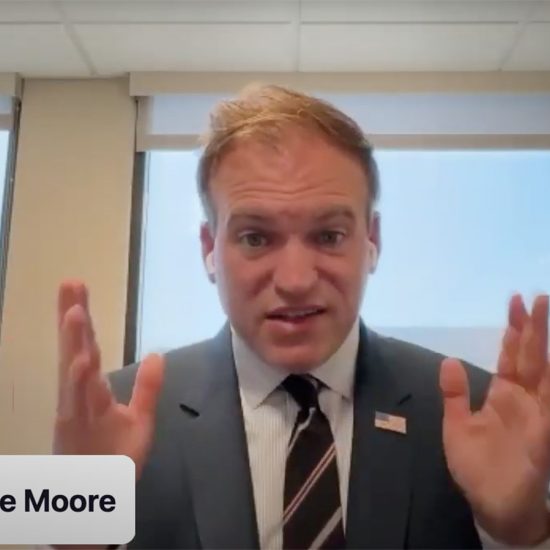

Liberty University entrance from March 24, as students were welcomed back to the campus during the coronavirus outbreak in Lynchburg, Va. Liberty University has profited from the COVID-19 pandemic by refusing to refund thousands of dollars in room and board and other fees owed to students after the school moved classes online last month, a federal lawsuit filed Tuesday alleges. (AP Photo/Steve Helber,File)
(RNS) — A student at Liberty University, an evangelical Christian school, has filed a class-action lawsuit against the school alleging that students were put at “severe physical risk” when the campus reopened in March despite the pandemic and accusing administrators of profiting from the health crisis by refusing to fully refund students.
The lawsuit, which was filed in federal court on Monday (April 13), focuses on Liberty’s refusal to fully close its campus in response to the pandemic caused by the novel coronavirus. The plaintiff, who is listed only as Student A “out of legitimate fear of retaliation and harassment,” contends that while allowing students to return to Liberty’s campus after spring break put their “health at risk,” the school had subsequently instituted several measures such as shifting to online classes and barring large gatherings.
“The University’s statement that it is ‘open’ is an illusion being put forth to try to keep money that should be returned to students and their families,” the complaint reads.
The suit goes on to suggest that the school’s decision to remain open in an official capacity allows administrators to avoid fully refunding students for fees paid to fund on-campus services and activities.
“Liberty University is, in a very real sense, profiting from the COVID-19 pandemic — keeping its campus services ‘open’ as a pretext to retain Plaintiff’s and the other Class members’ room, board, and campus fees, despite no longer having to incur the full cost of providing those services, all while putting students finances and health at risk,” it reads.
The case contends that while the school has offered a $1,000 credit to students who chose not to return to campus after spring break, the amount is inadequate, and alleges that Liberty’s “actions are unlawful and unfair.”
Liberty issued a statement decrying the lawsuit, insisting it is “without legal merit” and arguing that it is the law firm representing the student that seeks “to profit from a public health crisis,” not the school.
“Liberty University has tirelessly attempted to balance the needs of students, employees, and the community as it has navigated through the unprecedented health challenges presented by COVID-19,” the statement read. “We have also taken into account the economic impact and legal rights of all the parties involved. While it’s not surprising that plaintiff class action attorneys would seek to profit from a public health crisis, we don’t believe this law firm or its single client speaks for the vast majority of our students.”
The statement also adds: “Each of Liberty’s changes in operations and modes of delivery has been required by governmental officials, a fact the complaint omits. That fact legally excuses Liberty’s adjustments and leaves the plaintiffs without a legal case.”

Liberty University president Jerry Falwell Jr., gestures during an interview in his offices at the school in Lynchburg, Va., on Nov. 16, 2016. (AP Photo/Steve Helber)
Liberty and its president, Jerry Falwell Jr., have drawn widespread criticism for refusing to follow the lead of many other schools and close its campus.
Falwell initially downplayed the severity of the health crisis in mid-March, when he told students he was “hopeful” that the situation was “overhyped” and wondered aloud whether there is “a political motivation” behind widespread media coverage of COVID-19.
He also later suggested without evidence, during an appearance on the “Fox & Friends” television program, that the pathogen is actually a bioweapon.
“The owner of a restaurant asked me last night — he said, ‘Do you remember the North Korean leader promised a Christmas present for America back in December? Could it be they got together with China and is that that present?’ I don’t know, but it really is something strange going on,” Falwell said about the coronavirus during the show.
Since students returned to Liberty after spring break, at least one has tested positive for COVID-19, although school officials have noted that the student did not live on campus.
Students from at least two other schools — the University of Miami and Drexel University — have also filed class-action lawsuits demanding reimbursement in the wake of pandemic-related campus closures.
Some schools, such as New York University, are offering partial refunds to students. Others, such as Virginia Tech, have announced they will not issue tuition refunds.






